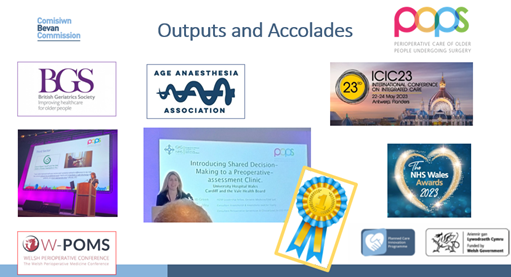Dr Margaret Coakley, Consultant Anaesthetist, Dr Nia Humphry, Consultant Perioperative Geriatrician, Cardiff and Vale & Dr Karina James, Consultant Geriatrician, Swansea Bay University Health Board
Perioperative Care of Older People Undergoing Surgery (POPS) Service in Elective General Surgery
Strategic Case for Adoption:
Patients aged 65+ make up over 40% of hospital admissions and occupy two-thirds of inpatient beds. Around 26% live with frailty, which increases surgical risk and impacts recovery, independence, and quality of life.
In Wales, an estimated 23,000 patients on elective surgery waiting lists could benefit from a Comprehensive Geriatric Assessment (CGA). The Perioperative care of Older People undergoing Surgery (POPS) model—built around CGA and Shared Decision-Making—is nationally recommended and proven in Wales to reduce risk, improve outcomes, and deliver cost savings.
However, most health boards have yet to embed frailty assessment into surgical pathways—highlighting a key gap in care.
POPS addresses these gaps and supports Wales’s strategic goals for planned care through the following means:
- Supports waiting list management by managing surgical wait times, validating referrals and optimising patient flow by identifying non candidates for surgery.
- Reducing preoperative specialist referrals and easing GP/Anaesthetic workload.
- Reducing reliance on general practitioners for preoperative optimisation.
- Optimising patient health and addressing unmet needs before surgery.
- Improving medication management.
- Enhancing shared decision-making and patient-centred care.
- Liaison with therapies to expedite discharge planning.
- Enhancing surgical outcomes and reducing hospital length of stay.
Evidence strongly supports that CGA can reduce perioperative complications, lower mortality rates, and prevent functional decline. This proactive approach results in shorter hospital stays and significant cost savings.
New Service Approach:
The approach includes screening for frailty and cognitive impairment, with a focus on identifying patients who would benefit from a Comprehensive Geriatric Assessment (CGA). The service seeks to improve surgical outcomes and reduce costs by addressing frailty-related risks before, during, and after surgery.
Methodology:
The approach has varied between Cardiff and Vale and Swansea Bay health boards owing to local priorities and available resources, with a common end goal of improving the care of older surgical patients living with frailty.
In Cardiff and Vale:
- Perioperative staff have been trained in frailty assessment; frail patients over 65 are referred to a dedicated band 6 POPS nurse to commence CGA that includes medical, cognitive, nutritional and functional assessment.
- The nurse coordinates referrals to appropriate services such as “ care and repair”, “ age well, live well” and highlights patients that will benefit from further geriatrician input for assessment.
In Swansea Bay:
- Patients over 65 on general surgical waiting lists are written to and provided with a frailty questionnaire.
- Patients are contacted by phone for a frailty risk assessments using tools such as the Clinical Frailty Scale, Hospital Frailty Risk Score, and CRANE questionnaire.
- Cases are discussed by the MDT to determine the need for clinical review or further interventions.
- Eligible patients are referred for a CGA with others being removed from the list if deemed inappropriate.
The CGA is usually completed face to face, however, it can be completed by phone. The CGA encompasses the following activities:
- Optimisation of existing comorbidities
- Medication review
- Coordination with anaesthetics
- Treatment escalation planning
- Shared decision-making regarding surgery suitability
CGA findings are shared with the multidisciplinary team to ensure a holistic approach to patient care.
The POPS service is currently applied across General Surgery, Gynaecology, Maxillofacial Surgery, and Urology departments in Cardiff and Vale and General Surgery, Urgent Suspected Cancer (USC) Colorectal, with plans to extend to Gynaecology in Swansea Bay.
Clinic & Systems Impact:
Data collected over a 9 month pilot period –
In Cardiff and Vale:
105 patients were reviewed by the POPS Doctor resulting in:
- 17% of patients not proceeding to surgery following shared decision-making
- 66 medications stopped
- 43 new medications being started
- 153 new medical diagnoses (primarily managed by the POPS Doctor)
153 patients were reviewed by a POPS Nurse resulting in:
- 84 nutrition interventions
- 12% being referred to Care and Repair for home adaptations
In Swansea Bay:
- 15% of patients on the laparoscopic cholecystectomy waiting list were removed following assessments. The approach continues to deliver similar reductions (15-20%) across other general surgery waiting lists.
- Medical optimisation – patients were better prepared for surgery, resulting in reduced single-specialist referrals and lower medication costs.
- Patients reported higher satisfaction due to improved communication and shared decision-making early in their care journey.
Economic Impact:
Both health boards validated their outcomes working in collaboration with their value-based health and finance teams, highlighting the significant cost benefits and financial sustainability of the model.
In Cardiff and Vale:
- Opportunity cost savings were calculated at £10,000 per month, equating to £120,000 annually.
- Annual recurrent savings were calculated in medication costs at £41 per patient.
In Swansea Bay:
- £250,000 was saved from unnecessary laparoscopic cholecystectomy surgery and related postponements.
- Projected annual savings of £351,334 with service being delivered across the main surgical specialties (general surgery, colorectal, hernia, and urology). These figures exclude additional savings from reduced preoperative assessments and onward referrals.
Key Requirements:
Cardiff and Vale and Swansea Bay operate a slightly different POPS approach as identified in the methodology section, thereby producing flexible resource options for service delivery.
Both deliver 3 CGA Clinics per week:
Cardiff and Vale:
- Upskilled Band 6 Frailty Nurse (1 WTE)
- Consultant Geriatrician (0.5 WTE)
- Band 3 Coordinator (0.3 WTE)
- Clinic space
Swansea Bay:
- Two full-time equivalent junior Clinical Fellows
Note: Clinical Fellows handle patient follow-ups and conduct in-clinic reviews for around 20% of patients who screen positive for frailty. Upskilled Clinical Nurse Specialists (CNS) or Advanced Practitioners could eventually fulfill these roles.
- One Band 3 Administrative support
- Consultant coverage currently managed through displaced Supporting Professional Activities (SPA), with plans for a permanent job plan allocation in the future.
- Clinic space
Benefits:
- Improved patient flow and outcomes
- Waiting list validation and reduction with significant resource release and return on investment
- Reduced hospital length of stay and associated costs
- Enhanced MDT collaboration and operational efficiency
- Upskilled staff with expertise in geriatric care
- Empowerment of patients to more proactively manage their health as per the “3 P’s” framework (Prevention, Protection, Promotion)
Resources for Health Boards
POPS Network: Resources for Clinicians
POPS Network: Resources for Implementation Planning
Relevant Policy
Our Programme for transforming and modernising planned care and reducing waiting lists in Wales (2022).
Goals:
- Effective referral
- Treat accordingly
Priorities:
- Transformation of outpatients
- Prioritisation of diagnostic services
- Implementation of a fair and equitable approach to patient prioritisation
- Eliminating long waiters at all stages of the pathway
- Building planned care capacity
- Appropriate information and support
Welsh Innovation Strategy (2023)
Priorities:
- Preventative health
- Diagnostics
- Reducing waiting lists
- Reduced time in hospital
- Supporting a talented workforce
Promote, prevent and prepare for planned care (2023):
Supports:
- Advice and guidance to patients and individualised care along the pathway
- Person centred approach and shared decision making
- Improved efficiency of care (reduced delays, fewer missed appointments)
- Improved health outcomes
- Collection of data
NHS Wales Technical Planning Guidance 2025 – 2028
Supports the ministerial priority of timely Access to Care
Service Presentation Material:
Service Implementation Material:
The POPS Network provides extensive resources to support implementation (links above).
Published Work:
POPS: Streamlining Surgical Waiting Lists Through Digital Triage, CGA and SDM
Use of an Automated Digital Flag for Identification of Older People Undergoing Emergency Laparotomy
Prevalence of Frailty Among General Surgery Patients at Morriston Hospital
Awards:
Winner of MediWales Scaling Up Innovation and Transformation Award 2025:

Finalists in NHS Wales Awards 2023 in the ‘Delivering higher value health and care’ category






